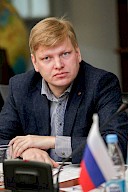Artem Dankov. Russia and Central Asia: new challenges and growth points

The global reformatting of the world order and economic models has determined the beginning of a new stage in cooperation between Russia and Central Asia. This stage requires an analysis of long-term trends, common challenges and limitations to growth in the new environment. We are facing serious challenges, which can only be overcome by coordinating joint efforts. Infrastructural limitations, the quality of human capital, climate change, difficulties in maintaining social stability, the need to transform economic models, sanctions pressure — all this forces our countries to act together. Therefore, it is important to formulate common responses to the questions facing Russia and the countries of Central Asia, thus ensuring the sustainable development of northern Eurasia. A special role in this process belongs to the regions which develop local cooperation taking into account the needs of ordinary people, local businesses, universities and non-profit organizations.
What are the key challenges facing modern Central Asia? What limits the possibilities for its development? Which long-term trends are shaping the political, social and economic landscape of Central Asia?
The first tendency is population growth. Despite the overall decline in the birth rate, Central Asia is the only region in the post-Soviet space where the population continues to grow...
Read the paper




